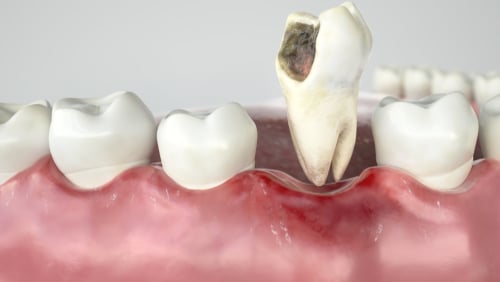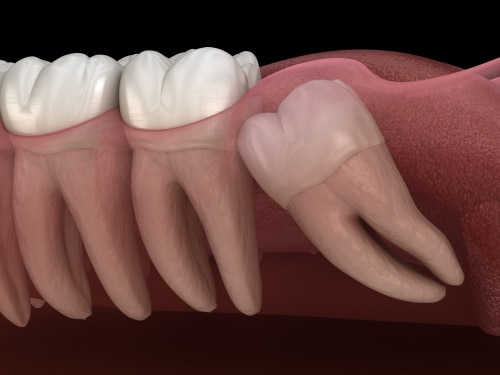Tooth Extractions in Union City, NJ
Providing gentle tooth extractions for patients who can benefit from tooth removal
According to recent estimates, nearly 3.5 billion people around the world suffer from oral diseases. There are several different reasons people may need tooth extractions, from routine reasons like pulling wisdom teeth to more critical ones like treating severe periodontal disease.
Other reasons for extractions include advanced tooth decay, overcrowded teeth, and tooth infection. If a person is going to be having braces fitted, an extraction or two may be needed to make room for other teeth as they shift.
Tooth extraction is a fairly quick outpatient procedure during which local or general anesthesia is administered. IV anesthesia might also be used. A nitrous oxide mask (“laughing gas”) can also be an option to help you relax. A tablet or pill can be taken before your procedure for the same purpose.
 At Union City Mini Dental Implants, we perform tooth extractions for our patients for a wide variety of reasons. We are committed to delivering superior care that is as comfortable and stress-free for our patients as possible. If you think you might need a tooth pulled, reach out to our friendly staff and request a free consultation.
At Union City Mini Dental Implants, we perform tooth extractions for our patients for a wide variety of reasons. We are committed to delivering superior care that is as comfortable and stress-free for our patients as possible. If you think you might need a tooth pulled, reach out to our friendly staff and request a free consultation.
During your free consultation, we will take X-rays, discuss your medical and dental history, and customize a personal treatment plan to map out the procedure you will undergo, including which type of extraction you need.
Types of Tooth Extractions
There are two types of tooth extractions – simple and surgical. Which one you have will largely depend on the condition of the tooth (or teeth) that will be pulled.
Simple Tooth Extractions
If the tooth is visible, usually, a simple procedure is all that is needed. Local anesthesia to numb the area around the tooth is often sufficient for pain management purposes during simple extractions.
When the area is numb, you will feel pressure during the extraction but no pain. An instrument called an elevator will simply loosen the tooth to make it easier to remove, which is done with small forceps.
Surgical Tooth Extractions
If your tooth is broken, impacted, or below the surface of the gum, a surgical extraction may be needed, which is more involved than a simple procedure. Depending on your specific situation, Dr. Diana Rodriguez, DMD, may need to cut the tooth or remove bone around it before extracting it.
In specific limited cases, some people might receive general anesthesia for surgical tooth extractions, which would be determined by the presence of certain medical conditions. With general anesthesia, the patient remains “asleep” and unconscious during the extraction.
Usually, however, a combination of local and IV anesthesia is all that is needed for most patients. The local anesthesia numbs the area to be worked on, and IV anesthesia helps patients feel relaxed and calm.
Preparing for Tooth Extractions
It’s important that you tell Dr. Diana Rodriguez, DMD, about any and all medications you are currently taking before your appointment for your tooth extraction. This information includes prescription medications as well as over-the-counter drugs, supplements, and vitamins.
Medical Conditions
In addition, you need to let us know if you have certain medical conditions, including the following:
- Diabetes
- Thyroid, liver, or renal disease
- High blood pressure
- Congenital heart defects
- Compromised heart valves
- Adrenal disease
Make sure to also tell us if you have an impaired immune system or a history of bacterial endocarditis. Our top priority is always our patients’ safety, health, and well-being.
You might be required to take a prescription antibiotic as a pre-treatment before your procedure. This pre-treatment might apply if your procedure is expected to be long, you have a compromised immune system, or you have congenital heart defects.
Things to Keep in Mind Before Your Procedure
 If you notice on or before the day of your procedure that you have a cold or you’ve recently had nausea or vomiting, please call us as soon as possible. We may need to reschedule your appointment.
If you notice on or before the day of your procedure that you have a cold or you’ve recently had nausea or vomiting, please call us as soon as possible. We may need to reschedule your appointment.
Don’t smoke before your appointment. You also should not eat or drink during the six to eight hours before your procedure.
If you will be under general anesthesia, you will need someone to drive you home.
Wear a shirt with short sleeves (or loose-fitting long sleeves) if you will be receiving IV anesthesia.
Recovering After Tooth Extractions
Typically, only a few days are needed for patients to recover after tooth extractions. To make sure your recovery goes as smoothly as possible, we recommend that you follow a few steps after treatment:
- Don’t smoke during recovery
- Bite down on the gauze pad to help the blood clot for 20-30 minutes
- Leave the gauze in place for a couple of hours or until it is soaked with blood
- Make sure to take all medications exactly as prescribed
- You can place an ice pack against your cheek to reduce swelling
- Rest for at least the first 24 hours following your procedure
- Do not drink using a straw for the first 24 hours
- Brush and floss as you usually do, but avoid the extraction area.
- Eat foods that are softer and slowly reintroduce regular foods after that
- After 24 hours, rinse your mouth with warm water and a half-teaspoon of salt
During your recovery, if you notice pain after several days, you begin running a fever, or you notice pus or drainage from the extraction site, make sure to call us as soon as possible and let us know. You might have an infection or a dry socket.
A dry socket can happen if the blood did not clot at the extraction site or it did but has been dislodged. The pain associated with a dry socket is a result of the bone of the socket walls becoming exposed. The condition is easily treated with medicated gel that we apply to the socket.
Placing New Teeth with Mini Dental Implants after Tooth Extractions
Mini dental implants offer our patients the opportunity to regain a happy, healthy smile with new teeth that are attached to small screws embedded in the jawbone. They can be used to replace a single tooth, multiple teeth, all of your teeth, or secure loose dentures.
Mini dental implants can usually be placed during the same procedure as your tooth extraction.
If you will be having a tooth extracted, it’s important that you preserve the volume and density of your jawbone, which will deteriorate at the extraction site if the removed tooth is not replaced. You may be interested in a mini dental implant as a replacement.
If you are interested in learning more about mini dental implants, we will be more than happy to discuss your options and their benefits.
Our state-of-the-art facility enables us to use the latest technology for accurate diagnoses and less invasive treatments, and Dr. Diana Rodriguez, DMD, has placed thousands of mini dental implants over the last two decades.
If you think you might need a tooth extraction, don’t wait any longer to contact us to request a free consultation. We’ll design a personal treatment plan for you that outlines exactly what will happen during your procedure.
Never hesitate to reach out to us at any time, before or after your appointment, if you have any questions or concerns. Contact us today!
